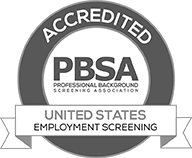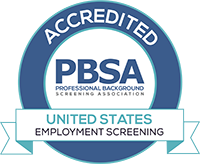BLOG
Chicago Strengthened Its Ban The Box Law
May 30, 2023
Existing Ban The Box Law
In 2015, Chicago passed a Ban the Box ordinance which prohibited employers with fewer than 15 employees from including questions about criminal history on job applications. This applied to businesses that operated within city limits, unless the position was:
- One that provided medical services.
- For an organization that is subject to state or federal laws which disallow applicants with certain convictions from being considered for hire.
The ordinance also required city agencies to assess any convictions that were discovered during the screening process, including:
- The nature of the offense and sentencing.
- The number of offenses.
- How much time has passed since the last offense.
- Whether there was any relevance between the offense and the position being sought.
- Any evidence of rehabilitation.
Updates
Updates to Chicago’s Ban the Box ordinance expand it to cover most public employers. It also prohibits them from asking about or using arrest records as a reason to refuse to hire, promote, train or discipline any individual. Arrest records are defined as:
- Those that did not result in a conviction.
- Juvenile records.
- Criminal records that were later expunged or sealed.
All covered organizations will now have to conduct the same individualized assessments of criminal records that were previously only done by city agencies. After reviewing convictions, employers may consider taking an adverse action if:
- Applicable law requires the exclusion of the person from a sought-after position because of their criminal record.
- A fidelity or bond is necessary and the individual’s record of more than one criminal offense disqualifies them from obtaining that bond.
- There is a substantial relationship between one of more of the individual’s criminal offenses and the employment sought.
- Granting or continuing employment would pose an unreasonably high risk to property or the safety of others.
Initiating Adverse Actions
Following the assessment process, if an employer chooses to proceed with the adverse action process, they must provide the subject with written documentation that includes:
- A description of the conviction(s) which caused the organization to consider the adverse action.
- A copy of the conviction record.
- A notice that informs the recipient they have at least five days to respond and request a reassessment, which could involve submitting evidence that disputes the accuracy of a conviction, mitigating evidence or proof of rehabilitation.
What Chicago Employers Should Know
Organizations in Chicago should be aware of these amendments and know that they went into effect immediately. If employers are found to have violated the ordinance, they could be fined up to $1,00 per violation or face license related disciplinary actions or discrimination charges.
Background Checks Are Crucial
Laws that Ban the Box and provide second chances are intended to help people who have served their time find employment, housing and other necessities. There are many of these laws and they vary by location, but in each scenario, background checks remain a critical part of the hiring process.
Background reports help employers make informed decisions, maintain safe workplaces and conduct due diligence. If your organization needs to screen applicants, volunteers, contractors or employees, please contact us. Our experienced team can help you customize screening packages based on your specific needs, relevant laws and industry best practices. We are available to assist you Monday through Friday from 5am to 6pm PT.







